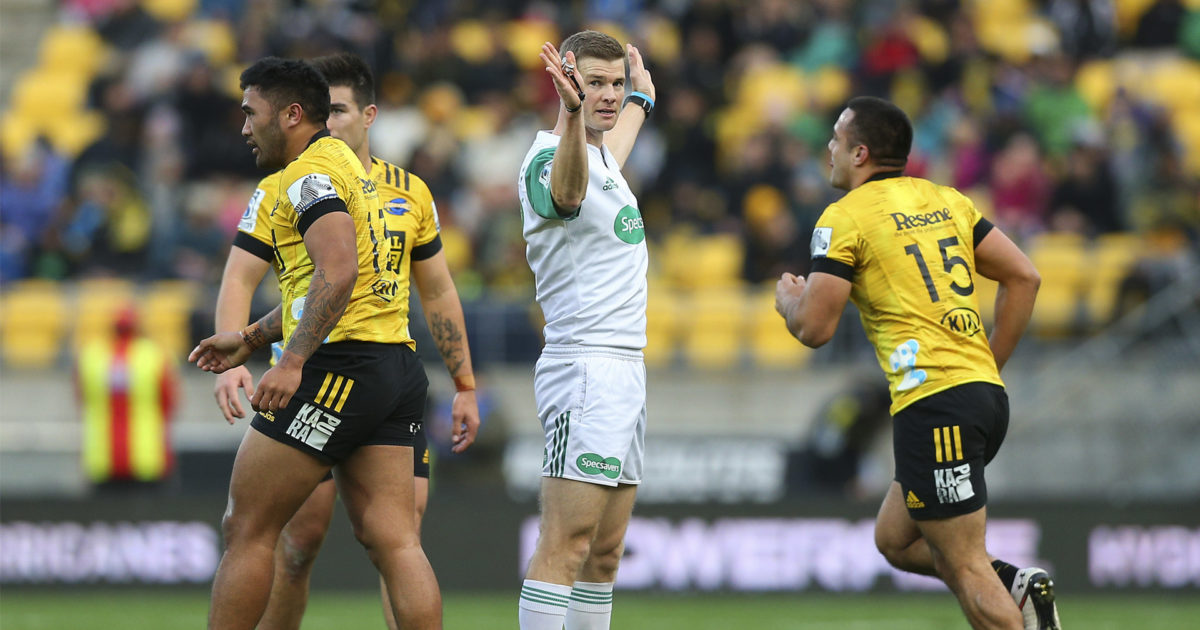The three-point problem that Super Rugby Aotearoa needs to fix fast

Super Rugby Aotearoa has three big problems that need to be fixed quickly to keep the large crowds rolling through the turnstiles.
Those three problems are obvious: the number of penalties, a clear confusion by all Super Rugby teams on how each game will be officiated and, subsequently, a slower than desired adjustment by players who’ve often found that the best-laid plans in training around the breakdown go out the window quickly.
If not addressed, these problems will trickle down to players struggling to deliver a consistent product.
For all the enthusiasm and commitment to the opening two weeks which have seen larger than usual crowds, such a result at the end of Super Rugby Aotearoa would be a tremendous shame.
So far, the referee’s whistle has been just as big a part of the game as any individual or team brilliance on either side, to the point where some of the paying customers could literally be heard counting the number of penalties in the stands.
Particularly in Dunedin in the very first match between the Highlanders and Chiefs, fans could’ve been forgiven for feeling like they were watching rugby played as a game of force back where the last team who had the ball with any sort of field position would be the winner by way of penalty.
That’s not the brand of rugby Super Rugby Aotearoa wants to be remembered for.
Across the four games of the competition so far, over 100 penalties have been dished out.
After the opening weekend of competition, NZR’s refereeing department had lengthy discussions with coaches, answering questions on the interpretations of the breakdown law that came out of the first two games.
In the aftermath of week two, it wasn’t obvious that players had a greater gauge on the rules – so expect further discussions.
Following his sides 24-12 loss to the Blues in Hamilton on Saturday, Chiefs coach Warren Gatland expressed frustration over how referee Ben O’Keeffe had officiated.
“It was a little bit frustrating because tonight it was refereed quite a bit different to last week at the breakdown”, Gatland said.
“One referee sees one picture and the other sees it slightly differently, they’re trying to speed things up and make the game faster but as long as they keep being consistent on the tackler the impetus is on us to get better”.
On the impetus front, Gatland hits the nail on the head. If the game is indeed to be faster, players are going to have to adjust to these rulings and get better, particularly around creating more space which only comes from cracking down on the offside law.
The Crusaders win was never in doubt, despite the close scoreline for the large portion of the match. And that's just because they are better, writes Hamish Bidwell. #HURvCRU #SuperRugbyAotearoa https://t.co/b2JSR4L5dw
— RugbyPass (@RugbyPass) June 22, 2020
Another area that players need to make concerted efforts in is addressing the act of coming into the side of the ruck at pace and knocking opposition out of the way. So far in SRA, that law has been officiated harshly and players themselves admit it is a good thing for the game moving forward.
But confusion reigns, particularly amongst coaches and players, thanks largely to different rulings during the opening fortnight.
Blues coach Leon MacDonald said that further discussions with NZR would be taking place as the Blues seek greater consistency from referees from week to week.
“We will be seeking clarity because the consistency from one week to the next is what everyone’s looking for while we are all trying to adapt to the new rules,” MacDonald said
“We all see the upside of the laws and what they’re trying to achieve, but we need to be open and honest with ourselves during the review. We want to play and people want to watch, that’s what everyone is searching for”.
What’s clear about the new interpretations is that they aim to make for faster attacking ball and a fairer contest between teams. If executed properly by all parties (referees and players), the new rules should make for entertaining rugby, at least when it’s played on a dry track.
https://www.instagram.com/p/CBuGmOQg9lC/
What’s also interesting is that the four games played so far have also seen a high amount of kicks in play. Territorial battles that amount to a glorified kick fest, particularly in wet conditions, aren’t the answer to keeping fans in the stands and this needs to be looked at, though trying to find a way to combat it is outside the scoop of what referees can control.
Referees have been instructed to be strict in their officiating in the areas they can control, so should the majority of the frustration be aimed at players?
The good thing is that NZR appear to be in constant communication with coaches who now have more questions than ever about how games will be officiated.
Let’s just hope it’s sorted out quickly.
Ultimately, creating a faster and more entertaining game is going to require a team effort because, yes, the impetus should be on players to adjust and clean up this area of the game, but they also can’t come close to doing that do without clear guidelines about these news laws that are spelled out in black and white.









































































